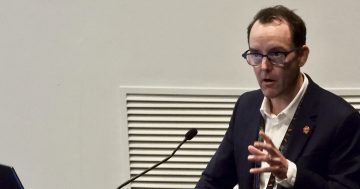
The term empower should be disempowered. Photo: Renew Europe.
Anyone who’s worked in the public service – or watched the TV show Utopia – knows about its love for jargon.
Pretentious, meaningless words are vital in bureaucracies that need to pretend to do what they’re not actually doing.
But lately, I’ve noticed some awful public service phrases creeping into everyday discourse (sorry, I mean conversation. I’m guilty, too).
We must put a stop to this trend before it’s too late.
Outside the grey cubicle, there’s never an excuse to use a big word when a diminutive synonym would sufficiently convey its connotation.
Here are five terms that should be exterminated from the English language.
Empower
There was once a time when it was enough to show or teach somebody something.
But now, we must “empower” them. For instance, the latest wave of government reform is designed to “empower the public service and increase trust and confidence in Australia’s public sector institutions”.
Naturally, the bureaucracy loves such a term, as it helps mask the powerlessness of many public servants and our declining trust in institutions. But why are so many others using it?
Netball Australia recently issued a media release saying its sport empowered girls to be strong and confident. The ABC has reported on how Ancient Asian music empowers kids with visual impairment.
You’ll notice the word is often used to describe what’s happening to women, people with disabilities, Indigenous families and other racial minorities – which shows how patronising it is.
Seriously, just say ‘teach’ and be done with it.
Neurodivergence
It’s probably now wrong to talk about disability, with neurodivergence being the popular buzz term.
But what exactly does neurodivergent mean? I know it’s used to describe those on the autism spectrum, but it seems people with ADHD, dementia and mental illness (diagnosed or undiagnosed) are sometimes included within the neurodivergent family.
Apparently, the term explains that people’s brains work differently. But doesn’t that mean we’re all neurodivergent, to a degree, and render the word meaningless?
Worse still, it’s also spawned even more pretentious offshoots – like neuroinclusivity. Delete now.
Stakeholder engagement
We know the government loves to talk about stakeholder engagement because it ’empowers’ people who participate in community consultation sessions, which it doesn’t take seriously.
But the term has now infected rugby league. In July, it was announced Canberra Raiders legend Mal Meninga would return to the club to increase “engagement with stakeholders”.
The Canterbury Bulldogs club have even appointed a general manager of stakeholder engagement, a job title that implies there are more paid positions to engage stakeholders.
How about clubs use that money to recruit better players and stick to calling us fans?
Workshop (as a verb)
When I was growing up, the term workshop was a noun used to describe a factory-like setting where people built and repaired things using tools and machines.
But now it’s often used in white-collar workplaces, universities and even social clubs – as a verb – to describe people talking. That’s quite a leap.
Perhaps people don’t want to say they’re just chatting, as it sounds like they’re not really working. But from discussion to meeting to debate, there are more accurate terms to use than a manufactured verb like workshop.
Keep it ‘high level’
I was invited to give a speech at a wedding a few months ago but told to “keep it high level”. Luckily, I’d been in the public before, so I knew what this meant – make it brief and avoid detail.
This phrase was always great for departmental meetings when I needed to speak about a subject I didn’t understand, and nobody else understood either. But it’s very different from the conventional meaning of ‘high-level’. The public service was always very confused when it came to ranking terms (the most junior person in the office was given a title like ‘senior policy officer’, for example).
Hence, there’s no need to use this deceptive phrase outside your siloed office.
So let me keep it high level one last time, and ask that all you neurodivergent stakeholders who read Region workshop with me the need to disempower this phrase, and the four above it.
Original Article published by Oliver Jacques on Riotact.
















